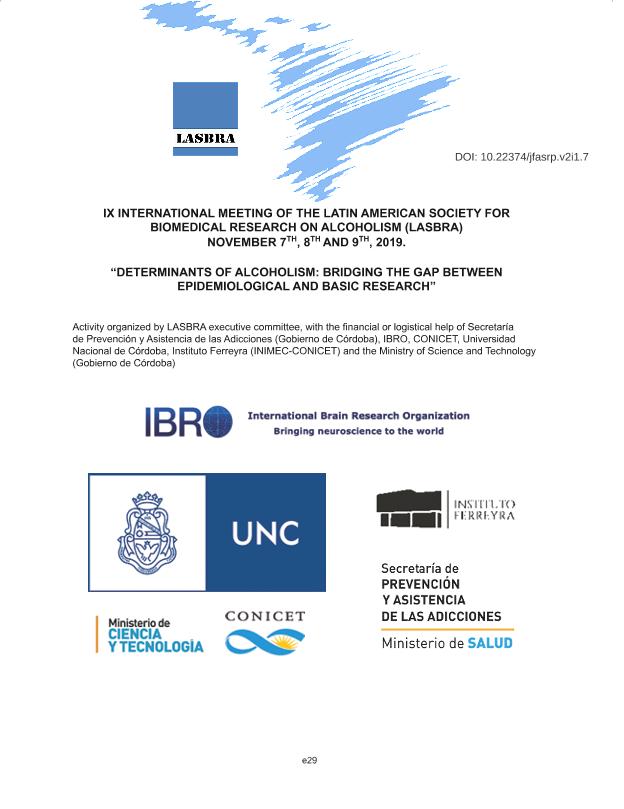Evento
The association between frequency of marijuana use and marijuana-related negative consequences in Argentinean college students
Ruffinato, Facundo; Mori, Akiko; Miranda Duarte, María Esther; Rivarola Montejano, Gabriela Belen ; Michelini, Yanina Noelia
; Michelini, Yanina Noelia ; Pilatti, Angelina
; Pilatti, Angelina
 ; Michelini, Yanina Noelia
; Michelini, Yanina Noelia ; Pilatti, Angelina
; Pilatti, Angelina
Tipo del evento:
Encuentro
Nombre del evento:
IX International Meeting of the Latin American Society for Biomedical Research on Alcoholism: "Determinants of Alcoholism: bridging the gap between epidemiological and basic research"
Fecha del evento:
07/11/2019
Institución Organizadora:
Latin American Society for Biomedical Research on Alcoholism;
Título de la revista:
Journal of Fetal Alcohol Spectrum Disorder
Editorial:
Dougmar Publishing Group
Idioma:
Inglés
Clasificación temática:
Resumen
Marijuana use, which is highly prevalent among college students, is associated with low academic performance and with greater risk of developing poor mental health (including depression). All these negative consequences seem to be positively related to higher frequency or intensity of marijuana use. The present study aimed to describe the frequency of marijuana use in Argentinean college students and examined its association with marijuana-related negative consequences. Argentinean college students who reported at least one episode of marijuana use during the previous year (n = 130, 72.3% women; M age = 23.02 ± 3.04 years) completed an online survey that measured marijuana frequency use in the past 12 months (from 1 = once-twice a year to 12 = four or more times a week) and marijuana-related negative consequences. Marijuana-related negative consequences were assessed via the Marijuana Consequences Questionnaire (MACQ). The MACQ is a 50-items scale grouped in eight subscales: Social-interpersonal Consequences, Impaired Control, Self-Perception, Self-Care, Risk Behaviors, Academic/Occupational Consequences, Physical Dependence, and Blackouts. Each item is scored dichotomously to reflect presence/absence of the NC. The total score reflects the total number of NC. Descriptive statistic was used to describe frequency of marijuana use for the total sample and as a function of sex. Bivariate correlations were conducted between the scores of MACQ?s subscales and frequency of marijuana use. Results: Forty per cent of the sample reported to use marijuana between one and nine times per year (low-frequency users), 18.5% reported to use between ten times/year and twice a month (medium-frequency) and 41.5% reported to use three or more times per month (high-frequency). Frequency of use was significantly associated with negative consequences in 6 of the MACQ?s scales. Specifically, positive significant associations were found between frequency of marijuana use and Impaired Control (r = .59; p ≤ .001), Self-Perception (r = .21; p ≤ .05), Self-Care (r = .48; p ≤ .001), Academic/Occupational Consequences (r = .37; p ≤ .001), Physical Dependence (r = .49; p ≤ .001), and Blackouts (r = .19; p ≤ .05). Discussion: The present findings showed that frequent use of marijuana significantly increased the risk of experiencing a broad myriad of negative consequences. Notably, 41.5% reported to consume marijuana at a frequent basis, suggesting these students might be at risk for developing marijuana-related problems. Frequent marijuana users should be identified and targeted for intervention.
Archivos asociados
Licencia
Identificadores
Colecciones
Eventos (IIPSI)
Eventos de INSTITUTO DE INVESTIGACIONES PSICOLOGICAS
Eventos de INSTITUTO DE INVESTIGACIONES PSICOLOGICAS
Citación
The association between frequency of marijuana use and marijuana-related negative consequences in Argentinean college students; IX International Meeting of the Latin American Society for Biomedical Research on Alcoholism: "Determinants of Alcoholism: bridging the gap between epidemiological and basic research"; Córdoba; Argentina; 2019; 69-69
Compartir
Altmétricas



